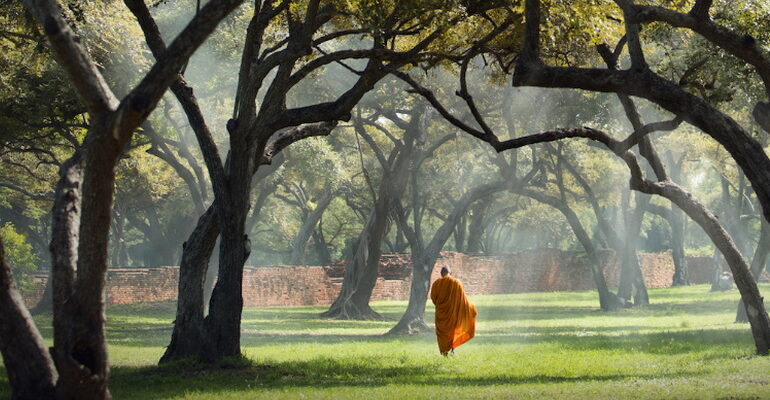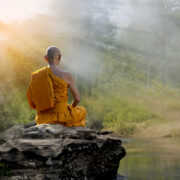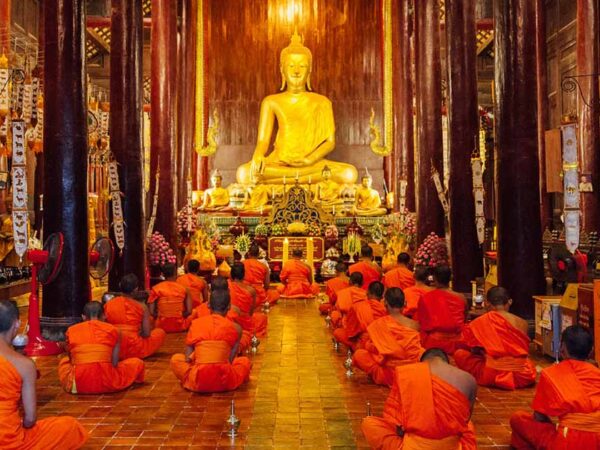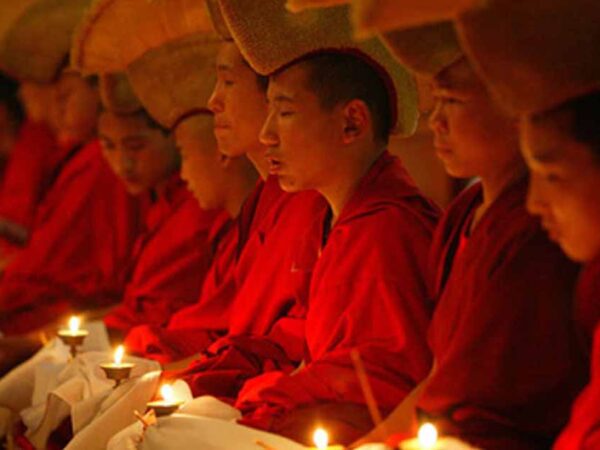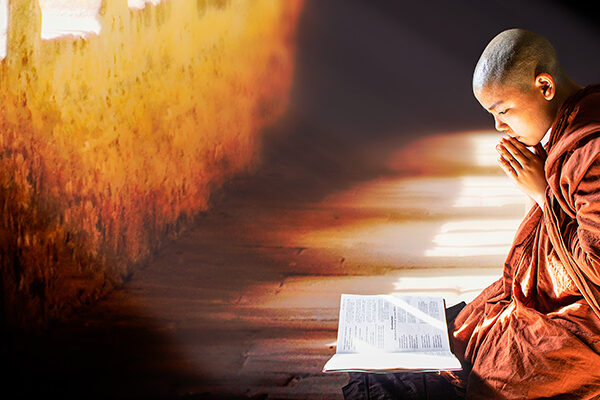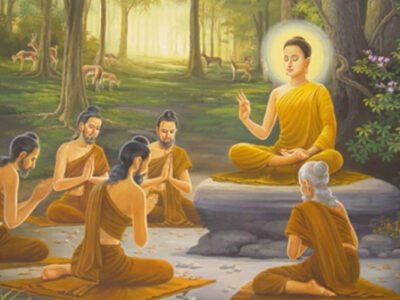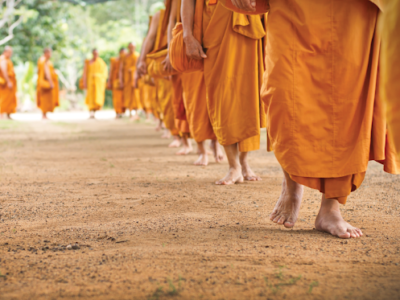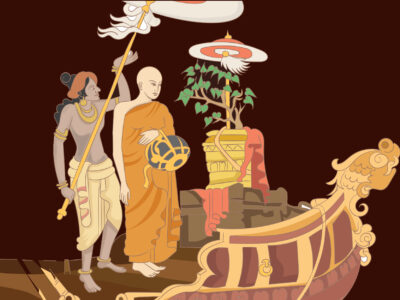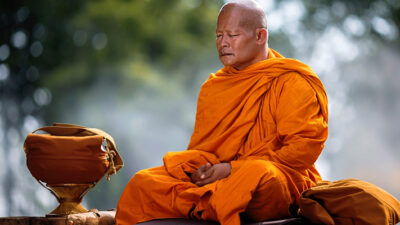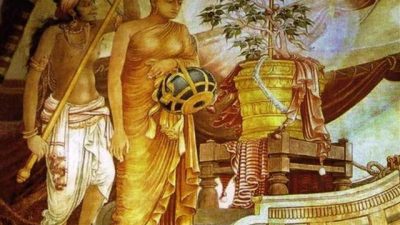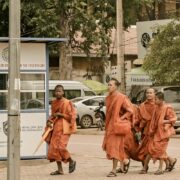Venerable Dr. H. Gunaratana Mahathera
In learning the Buddha’s teachings, we learn much more than just concepts. We learn cultivation of the mind of bhavana. The word bhavana derives from the root “bhu” to be or to become, or to cultivate. We cultivate our mind to learn to see things as they really are. In this way, we begin to walk the path that leads to the end of suffering. So meditation means the way to the end of suffering. That is why we meditate.
To cultivate this path we must avoid all extremes. The Path that leads to happiness is called the Middle Path. The Middle Path does not have an upper middle path or a lower middle way, as we sometimes wish it would. The Middle Path does not mean we should do some good here, get away with a little unwholesomeness there, and in general whip up for ourselves a religious fruit salad. The Middle Way also reminds us to avoid extremes.
There are three pairs of extremes in life. One pair is the extreme of Self indulgence and the extreme of self-mortification. Prince Siddhartha, as the son of a king, experienced sensual pleasures in the extreme and knew what self-indulgence was. Then he renounced all of it in the prime of his youth and began to practice self-mortification. He was almost on the verge of death because he didn’t eat, didn’t sleep, and tortured his body in every fashion to experience the extremes of self torture. Then he realized that none of these extremes brought him the peace and happiness he was seeking.
Then there is the second pair – the extreme of eternalism and the extreme of nihilism. Eternalists believe in a permanent soul, a permanent self. They believe soul continues to exist without ever coming to an end. It goes on forever and ever. Nihilists, on the other hand, believe that when we die, that’s it, the show is over. Everything ends. Nothing survives death.
According to the nihilists, everything is happening here and now and nothing happens after death.
Yet in the Buddha’s teaching of Dependent Origination everything that pertains to our mentally and materially rises and falls away depending upon their causes and conditions. When the causes pass away their results pass away as well. When causes exists, its result is inevitable. This happens every moment and at the moment of death this casual relationship does not cease. The primary reasons for this are ignorance and craving.
Ignorance means ignorance of the Four Universal Truths – the Truth of the existence of unsatisfactoriness of life; the Truth of this cause; the Truth that it can be ended, and the Truth that there is a way to end it. The Truth of the existence of unsatisfactories of life should be fully comprehended. The cause of unsatisfactoriness should be eliminated. The Truth of the end of unsatisfactoriness should be realized by following the specific method prescribed by the Buddha.
Explaining craving, the cause of the unsatisfactoriness of life, the Buddha said, “And what, monks, is the Noble Truth of the Origin of Suffering? It is craving which gives rise of rebirth, bound up with pleasure and lust, finding fresh delight now here, now there that is to say sensual craving craving for existence and craving for non-existence.
Rebirth takes place every moment in one’s life time. Consciousness changes many times every moment. It changes with such an inconceivable rapidly that one may feel it to be sold. The process repeats itself even after conventional death. Life does not stop at the moment of conventional death. So long as the roots of existence are nourished by greed and ignorance, life continues after death. And so the process of Dependent Origination continues. Only when the roots of existence that very craving for life and ignorance – are totally exhausted does life cease to repeat. This can happen in one life or many countries lives.
Nihilists by to interpret even Dependent Origination to suit their views. Some say Buddha’s teaching of rebirth is foolish. The Buddha said such nihilistic views fall under the category of suffering from not getting what you wish:
‘And what is not getting what one wants? In beings subject to birth, monks, this wish arises. ‘Oh that we were not subject to birth, that we might not come to birth! But this cannot be gained by wishing. That is not getting what one wants”
Nihilists are so frustrated with life that they don’t want to have any more birth. If this though were supported by doing what they need to do, then they might realize this wish. What they need to do is eliminate the cause of rebirth, which is craving. Without eliminating craving, no matter how many nihilistic views they express they are going to be reborn according to their Kamma. Nihilistic view is wrong view, which is one of the ten unwholesome Kammas. Craving cannot be eliminated without realizing the Noble Eightfold Path. And mere intellectual understanding of the Noble Eightfold Path is sufficient.
Rebirth occupies such a central position in Buddhism that even three of the four stages of enlightenment are named according to the number of rebirths they take. The one who attains the first stage of sainthood is known a Stream Enterer, otherwise called, “Seven times at the utmost (sattakkahattuparama), One who attains the second stage is called “Once Returner” (Sakadagami), And the third stage is called ‘Never Returner’ (Anagami). These are not terms coined by ommentators but by the Buddha himself.
In the well known stazas that the Buddha recited at the end of the Dependent Origination formula, he said:
“Through many a birth
I wandered in samsara,
The builder of this house
Sorrowful it is to be born
again and again.
O house – builder! Thou artr seen.
Thou shalt build no house again
All thy rafters are broken
The ridge pole is shattered
My mind has attained the
Unconditioned
Achieved is the end of craving.
Dependent Origination explains what is happening during momentary birth and death, and that of perpetual birth and death, life after life. The repetition of this momentary birth and death continues because of the presence of craving and ignorance. The moment that craving and ignorance are totally eliminated this cycle ceases to exist. It can happen in one lifetime or in ten, twenty, or millions of life times. It all depends on how we understand Dependent Origination and act according to our understanding of the Four Universal Truths.
Wishing to exist forever is one extreme and wishing not to have any more birth is another extreme. Those who fail to eliminate the cause of rebirth, may very earnestly wish to promote their nihilistic views through the wrong interpretation of the Dependent Origination. Yet they will continue to exist in Samsara and continue to suffer until they realize Dependent Origination correctly.
The third pair of extremes is the belief that everything exists or nothing exists. Those who believe everything exists believe that things exist in all situations without any exception. Those who believe nothing exists believe nothing under any circumstance really exists and therefore nothing is real. All we see and know is a manifestation of delusion in our own minds.
We must avoid all these extremes. The Buddha pointed out that all things have conditional existences. Yet those conditions are not permanent. Causes and conditions can come into existence and they can go out of existence. Suffering is caused and conditioned by numerous factors. Therefore, even suffering does not exist unconditionally. What we must find out are the causes and conditions that cause suffering.
(Kind courtesy – Voice of Buddhism)

